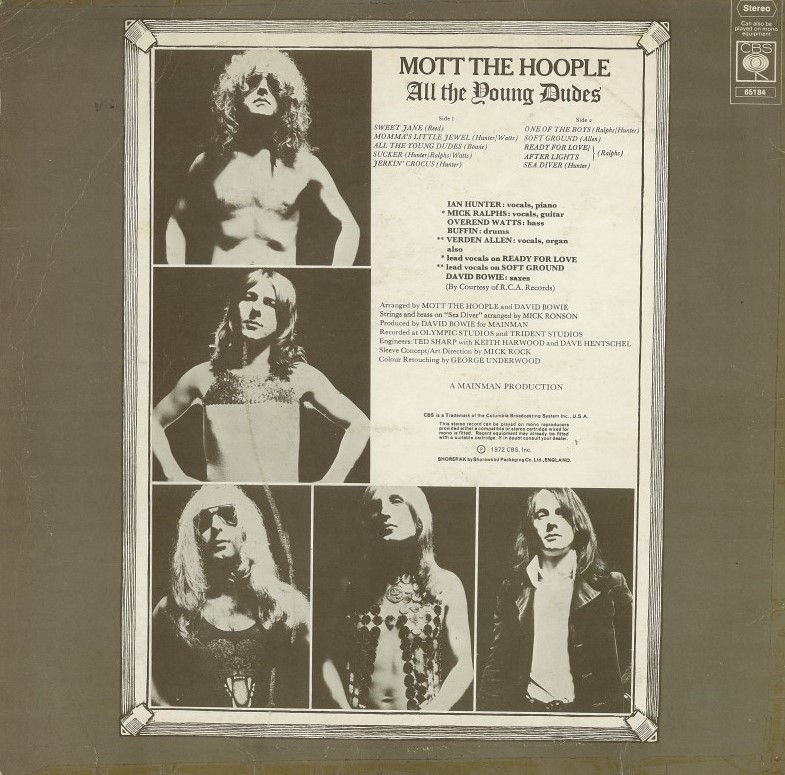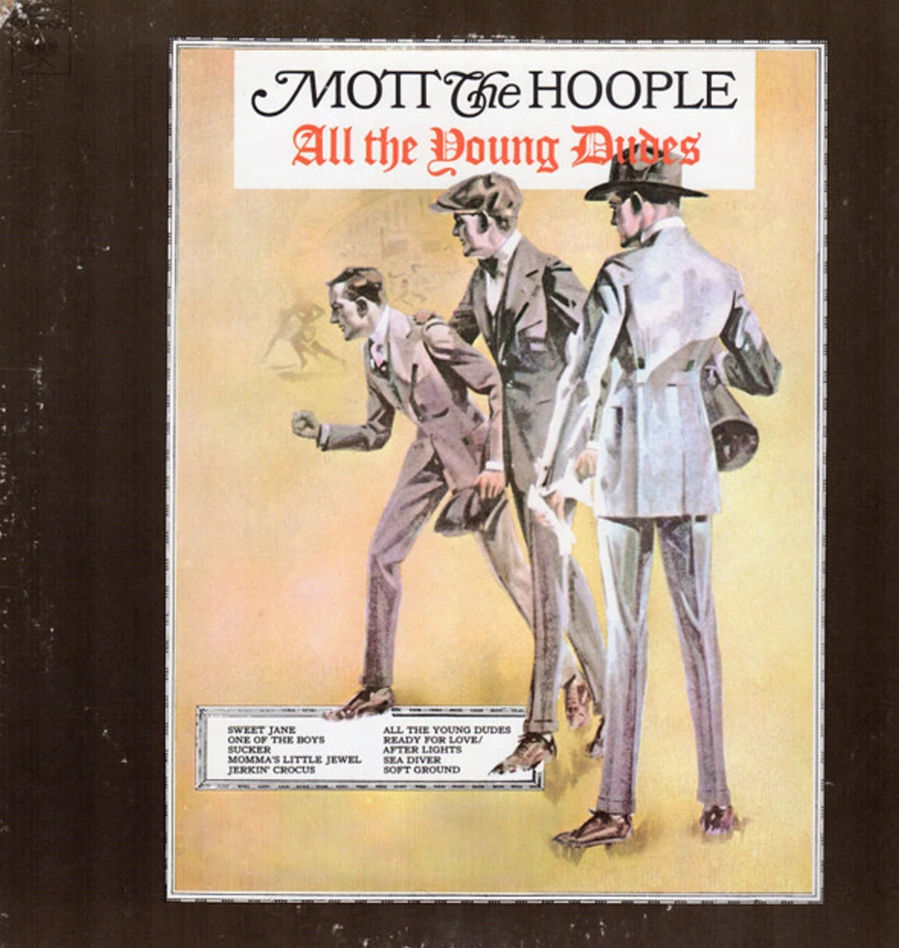Mott The Hoople: "All the Young Dudes" Album (1972)
- Mott The Hoople

- Sep 8, 1972
- 4 min read
Updated: Sep 23
Mott The Hoople’s All the Young Dudes was released as an LP album in the UK by CBS Records (catalog number S 65184) on September 8, 1972, marking their fifth studio album and a pivotal commercial breakthrough after years of cult status.

Release Details:
UK: Released as a 12" vinyl LP on CBS Records (S 65184) on September 8, 1972.
US: The album was also issued in the US by Columbia Records (KC 31750) with a different design on the back of the sleeve.
Chart Performance:
The album was a commercial success, reaching #21 on the UK Albums Chart and #89 on the US Billboard 200. The title track, "All the Young Dudes," was a major hit single, peaking at #3 in the UK and #37 in the US.
Key Tracks:
"All the Young Dudes": Written by David Bowie, this glam rock anthem became Mott’s signature song, with its anthemic chorus and lyrics celebrating youth and rebellion. Featuring Ian Hunter’s emotive vocals, Bowie’s backing vocals, and Andy Mackay’s (Roxy Music) saxophone, it was a #3 UK hit and is considered a glam rock classic.
"Sweet Jane": A cover of The Velvet Underground’s song, arranged with a glam rock flair. Bowie’s influence is evident in its polished production, making it a standout track.
"One of the Boys": Released as a single in the US (Columbia 4-45695), it reached #96 on the Billboard Hot 100, showcasing the band’s hard rock edge.
"Sea Diver": A tender ballad closing the album, highlighting Hunter’s songwriting depth.

Context and Background
Mott the Hoople in 1972:
Formed in 1969 in Herefordshire, England, Mott the Hoople were a cult rock band with four albums (Mott the Hoople [1969], Mad Shadows [1970], Wildlife [1971], Brain Capers [1971]) that failed to achieve major commercial success. By early 1972, they were on the verge of breaking up after a lackluster Zurich performance on March 16, 1972.
David Bowie, a fan of the band, intervened by offering them “Suffragette City” (which they declined) and then “All the Young Dudes,” which he wrote specifically for them. Bowie’s production and involvement revitalized the band, giving them their first major hit and a new glam rock identity.
Track Listing
Side A:
"Sweet Jane" (Lou Reed)
"Momma’s Little Jewel" (Ian Hunter, Pete Overend Watts)
"All the Young Dudes" (David Bowie)
"Sucker" (Ian Hunter, Mick Ralphs, Pete Overend Watts)
"Jerkin’ Crocus" (Ian Hunter)
Side B:
"One of the Boys" (Ian Hunter, Mick Ralphs)
"Soft Ground" (Verden Allen)
"Ready for Love/After Lights" (Mick Ralphs)
"Sea Diver" (Ian Hunter)
Notes: The album was produced by David Bowie, with additional production by Mott the Hoople.

The US version (KC 31750) is identical in track listing to the UK release, though some international pressings (e.g., Japan) include bonus tracks on reissues.
Musical and Cultural Significance:
All the Young Dudes is a landmark glam rock album, bridging Mott’s raw rock roots with the theatricality of the early 1970s UK scene. Bowie’s production polished their sound, aligning them with contemporaries like T. Rex and Slade.
The title track became an anthem for disaffected youth, often interpreted as a celebration of glam’s outsider ethos. Its cultural impact endures, with covers by artists like Billy Bragg and its inclusion in films like Juno (2007).
The album blends hard rock (“Sucker,” “One of the Boys”), glam anthems (“All the Young Dudes”), and introspective moments (“Sea Diver”), showcasing Mott’s versatility.
Released in 1972, it competed with albums like David Bowie’s The Rise and Fall of Ziggy Stardust and the Spiders from Mars and Roxy Music’s debut, cementing glam rock’s dominance.
Critical Reception:
Critics at the time praised the album, with Rolling Stone calling it “a breakthrough” for Mott, highlighting Bowie’s production and the title track’s impact. AllMusic rates it 4.5/5, noting its “perfect balance of raw energy and glam polish.”
Retrospective reviews, like those on RateYourMusic (3.8/5), celebrate its enduring appeal, though some fans prefer the band’s earlier, rawer sound or their follow-up, Mott (1973).
The album is often ranked among the best glam rock records, with “All the Young Dudes” listed in NME’s top 500 songs and the album in Rolling Stone’s essential 1970s albums.
Streaming and Compilations:
The album is widely available on Spotify, Apple Music, and YouTube, with the original track listing and remastered versions (e.g., 2006 Columbia/Legacy reissue).
Expanded editions (e.g., 2006) include bonus tracks like demo versions of “All the Young Dudes” and “One of the Boys.”
Key tracks appear on compilations like The Best of Mott the Hoople (2003) and All the Young Dudes: The Anthology (1998).

Additional Notes
Musicians and Production:
Produced by David Bowie, with contributions from Mott the Hoople, the album was recorded at Olympic Studios and Trident Studios, London, in 1972.
The band included Ian Hunter (vocals, piano), Mick Ralphs (guitar), Pete Overend Watts (bass), Dale “Buffin” Griffin (drums), and Verden Allen (organ). Guest musicians included Andy Mackay (saxophone) and Bowie (backing vocals).
Bowie’s production added a glam sheen, with lush arrangements and a focus on Hunter’s emotive vocals, elevating Mott’s raw rock sound.
Cultural Context:
Released in 1972, All the Young Dudes captured the glam rock zeitgeist, with its androgynous aesthetic and youth-centric themes. It resonated with fans of Bowie, T. Rex, and Slade, while appealing to rock audiences with its raw energy.
The title track’s association with glam’s outsider ethos made it a generational anthem, later adopted in punk and indie contexts.
The album’s release followed Mott’s near-breakup, making it a story of redemption, as detailed in the B-side “Ballad of Mott the Hoople” from their later single (1973).
Legacy:
All the Young Dudes is Mott the Hoople’s defining album, credited with saving their career and cementing their place in rock history.
The title track remains a cultural touchstone, covered by artists like Ozzy Osbourne and featured in films, TV shows, and commercials.
The album influenced later bands like The Clash and The Smiths, with its blend of raw rock and theatricality.




Comments